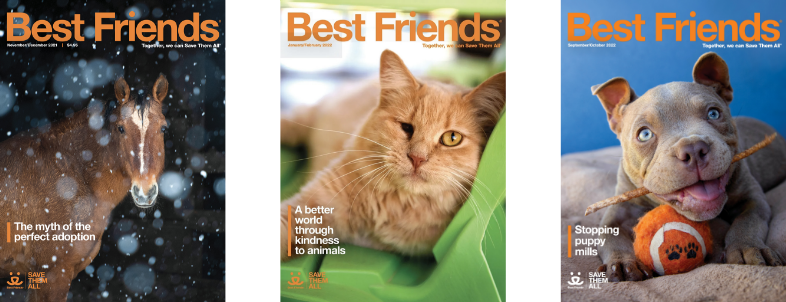10 advocacy wins for the animals

Laws, ordinances and policies can help or harm the animals we love. They have a real impact on whether or not pets end up in shelters and face the risks of being killed there. That’s why advocacy is a key part of how we’ll reach no-kill in every community across the country by 2025. And we’re not alone. In fact, Best Friends’ 2025 Action Team, a community-driven grassroots movement, has doubled in size to more than 80,000 members nationwide. Isn’t that outstanding?
Using their collective power in 2022, the 2025 Action Team took more than 100,000 actions for the animals and worked alongside Best Friends’ legislative team to achieve great things. Here are just a few of the highlights from last year ― inspiration for an even bigger 2023.
- Eleven local humane pet sales ordinances were enacted in seven states, including the cities of Houston and Dallas, while six bills sponsored by the pet industry to prevent humane pet sales were defeated in Illinois, Utah and Florida. We also successfully lobbied the New York legislature to enact a bill prohibiting retail puppy mill sales statewide. It’s awaiting the governor’s signature.
- Senate Bill 971, enacted in California, improved access to rental housing for low-income pet owners, without burdensome breed or weight restrictions or monthly pet fees.
- In Arizona, Gov. Doug Ducey signed into law House Bill 2323, which prohibits homeowner and renter insurance companies from using a dog’s breed as the sole consideration for determining risk, liability or any other matters relating to claims involving dogs on the premises. Advocates sent more than 7,500 messages to legislators in support of HB 2323.
- At the annual meeting of the National Council of Insurance Legislators (NCOIL), Best Friends organized a panel of experts to debunk insurance companies’ claims that breed is a factor in dog bites. Best Friends testified in favor of a model bill with substantive changes at the NCOIL summer meeting. The model bill is being rewritten pursuant to the testimony, and it might be voted on at the NCOIL’s next annual meeting in November.
- To garner support for ending breed-restrictive insurance practices, Best Friends launched statewide petitions calling for decision-makers to take action on this issue. Across 53 petitions, there are 19,330 signatures, with many advocates adding their own stories of how they were impacted by breed-restrictive insurance practices.

- At least 11 communities repealed their breed-specific ordinances and that number is growing.
- Best Friends spearheaded the removal of a pit bull provision in the model dangerous dog law drafted by Tennessee Municipal Technical Advisory Services.
- Best Friends led the efforts to have a resolution adopted by the National Black Caucus of State Legislators (NBCSL), stating that NBCSL opposes all breed-specific legislation (BSL) and restrictions. It also encourages local governments to repeal BSL and encourages state governments to pass preemption bills to prevent local governments from adopting or enforcing breed-specific legislation or restrictions.
- In the Carolinas, Best Friends led the charge to implement trap-neuter-vaccinate-return (TNVR) as a humane community cat management program in Durham County, North Carolina, and Horry County, South Carolina. Since our involvement in Horry County, the overall save rate has gone from 63.9% in 2020 to 83.6% in 2021. And Durham County finally approved an ordinance to permit TNVR, which will be implemented in 2023.
- Best Friends spearheaded a community cat ordinance in Madison County, Illinois, to save more cats in the state’s eighth largest county. Madison County Animal Care and Control’s cat save rate is now more than 90%.

This article was originally published in the January/February 2023 issue of Best Friends magazine. Want more good news? Become a member and get stories like this six times a year.
Start small to make a big difference
Join the Best Friends Action Team and be a voice in your community for homeless pets.
Take action for pets and people
Read more
Grassroots Advocacy Toolkit Introduction
